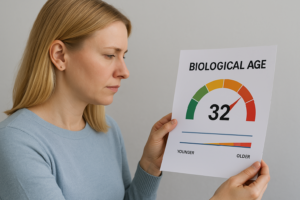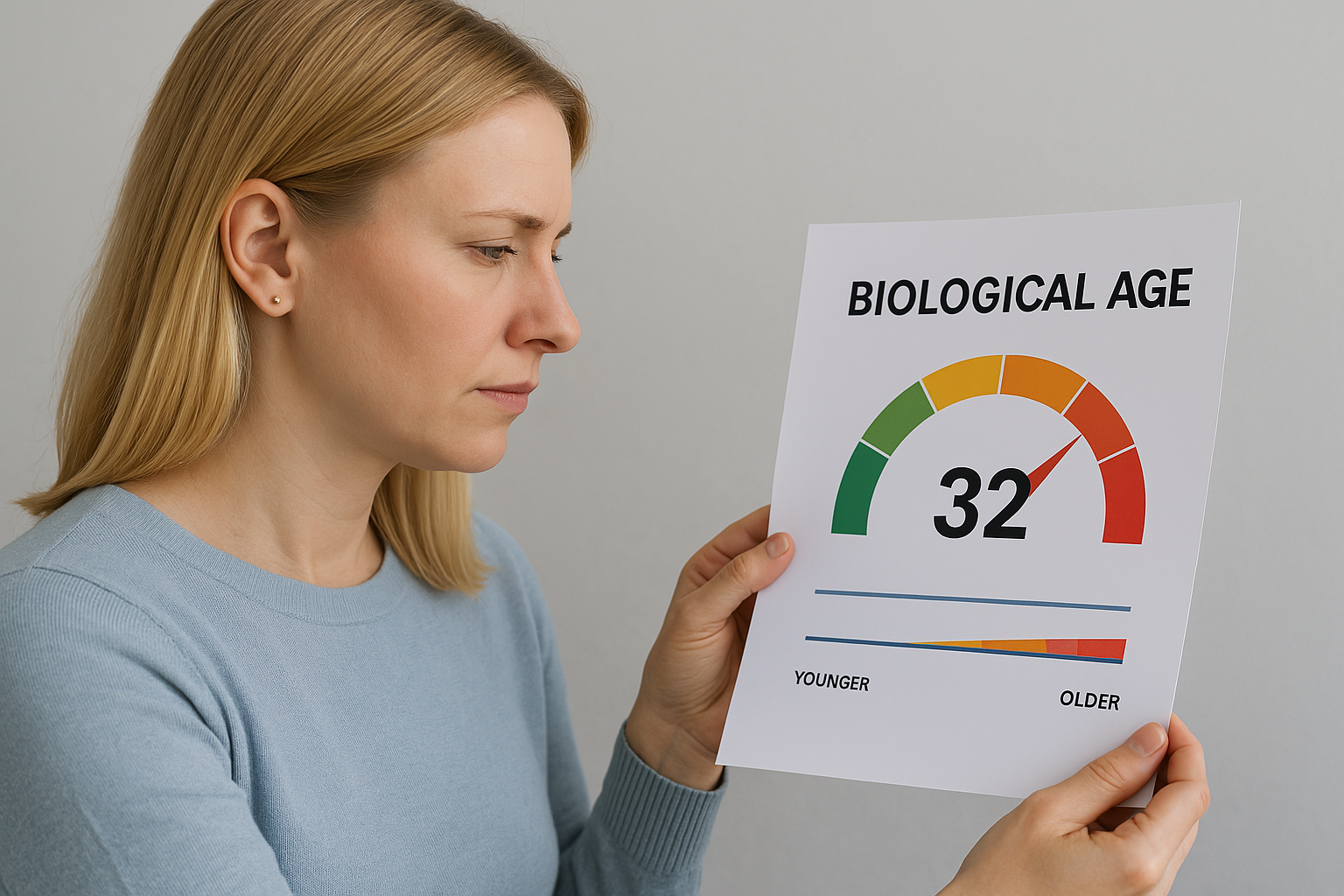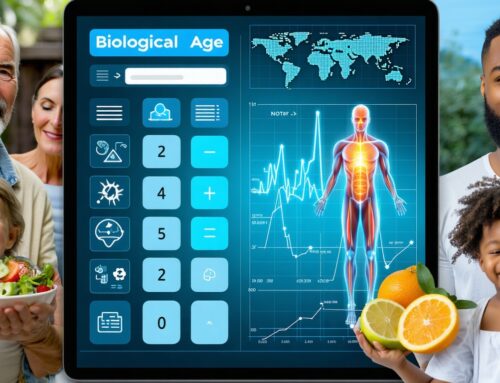
reviewing a biological age score
Understanding Biological Age
Epigenetic Alterations and Aging
Biological age isn’t just about counting birthdays. It’s more about how your body is holding up and how likely you are to face those pesky age-related health issues. Lately, science has been buzzing about epigenetics, which is all about those little chemical tweaks happening above your DNA. These might just be the secret sauce to figuring out how old your body really feels (Harvard Bioethics Journal).
Epigenetic changes, like DNA methylation, are big players in the aging game. They can mess with how your genes do their thing without actually changing the DNA itself. Over time, these tweaks pile up, leading to cells that just don’t work as well. Epigenetic clocks, which check out DNA methylation in your blood, are currently the best bet for guessing your biological age.
Factors Influencing Biological Age
Your biological age is shaped by a mix of your genes and how you live your life. While your DNA only accounts for about 15% to 25% of how you age, your lifestyle choices have a much bigger say in how gracefully you age (Mayo Clinic). This means what you do every day really matters.
Key Factors Influencing Biological Age:
- Diet: What you chow down on can really affect your biological age. Eating foods packed with antioxidants, vitamins, and minerals can help keep the aging process in check. For more tasty tips, check out our section on biological age and diet.
- Exercise: Keeping active helps you hold onto muscle, boosts heart health, and cuts down the risk of chronic illnesses. Get the lowdown on exercise benefits in our article on biological age and exercise.
- Stress: Being stressed out all the time can speed up aging by cranking up inflammation and oxidative stress in your body. Find ways to chill out in our article on biological age and stress.
- Sleep: Catching quality Z’s is crucial for fixing up cells and staying healthy. Skimping on sleep can mess with your biological age. Learn more in our article on biological age and sleep.
- Environmental Factors: Being around pollutants, pesticides, and chemicals can age you faster. Check out how these factors play a role in our articles on biological age and pesticides and biological age and plastics.
| Factor | Impact on Biological Age |
|---|---|
| Diet | High impact |
| Exercise | High impact |
| Stress | Moderate impact |
| Sleep | Moderate impact |
| Environmental Factors | Variable impact |
Knowing about these factors can help you make smarter choices to keep your biological age in check. For a more tailored look at your age, try using a biological age calculator or check out biological age assessment tools.
By zeroing in on these areas, you can take charge of your life and age like a fine wine.
Biomarkers for Biological Age
Ever wondered how old your body really feels? Understanding your biological age can give you a sneak peek into your health and how long you might stick around. Biomarkers are like your body’s secret diary, revealing the nitty-gritty of aging beyond just counting birthdays. Let’s dive into two big players: epigenetic clocks and blood biomarkers.
Epigenetic Clocks
Epigenetic clocks are like the Sherlock Holmes of aging—they’re super precise at figuring out your biological age. They look at DNA methylation, which is basically some chemical tweaks to your DNA that don’t mess with the actual sequence. These changes can spill the beans on how your body’s holding up at the cellular level (Harvard Bioethics Journal).
These clocks do their thing by checking out specific spots on your DNA where methylation happens. The amount of methylation at these spots can give a pretty good guess of your biological age. Studies have shown that biological age, as measured by these clocks, can be linked to stuff like feeling down, getting diseases like breast cancer, and even how long you might live (Harvard Bioethics Journal).
| Biomarker | What’s It About? | Health Connections |
|---|---|---|
| DNA Methylation | Chemical tweaks to DNA without changing the sequence | Depression, disease risk, mortality |
Curious about how to figure out your biological age with these clocks? Check out our article on how to calculate biological age.
Blood Biomarkers for Aging
Blood biomarkers are another cool way to peek into your biological age. These include various tests that can give you the lowdown on how your body’s aging. Some usual suspects in the blood biomarker lineup are:
- Blood Pressure: High blood pressure can be a red flag for heart issues and other aging-related problems.
- Cholesterol Levels: Too much cholesterol can mean trouble for your heart.
- Inflammatory Markers: Chronic inflammation is tied to a bunch of aging-related diseases like arthritis and Alzheimer’s.
- Glucose Levels: High blood sugar can signal a risk for diabetes and other metabolic hiccups.
| Biomarker | What’s It About? | Health Connections |
|---|---|---|
| Blood Pressure | Force of blood against artery walls | Heart issues |
| Cholesterol Levels | Amount of cholesterol in the blood | Heart disease |
| Inflammatory Markers | Signs of inflammation in the body | Arthritis, Alzheimer’s |
| Glucose Levels | Blood sugar levels | Diabetes, metabolic disorders |
You can get these blood biomarkers checked with regular lab tests, and they can spill some serious tea on your biological age. For a full scoop, consider using biological age assessment tools that include these biomarkers.
Knowing your biological age through epigenetic clocks and blood biomarkers can help you make smart choices about your health and lifestyle. By keeping an eye on these biomarkers, you can take steps to boost your well-being and maybe even add some extra years to your life. For more on how lifestyle affects biological age, check out our articles on biological age and exercise, biological age and stress, and biological age and sleep.
Impact of Diet on Biological Age
Role of Nutrition in Aging
What you eat can make you feel like a spring chicken or an old-timer. Your food choices can speed up or slow down how fast your body ages. A big study with over 22,000 folks in Italy found that munching on too many ultra-processed foods can make you age faster on the inside (Medical News Today). These foods are often loaded with sugar, salt, bad fats, and weird additives, but they miss out on the good stuff like fiber and nutrients you get from whole foods.
| Food Type | Impact on Biological Age |
|---|---|
| Whole Foods | Slows down aging |
| Ultra-Processed Foods | Speeds up aging |
Eating lots of ultra-processed foods was linked to faster aging, adding about 0.34 years to your biological age compared to those who ate less. If more than 14% of your daily calories come from these foods, you’re likely aging faster, according to a clock that checks 36 blood markers (Medical News Today).
Effects of Added Sugar on Aging
Sugar, sugar, sugar—it’s not just bad for your teeth. Added sugar can also make you age quicker. Even if you’re eating a diet full of vitamins and minerals, each gram of added sugar can bump up your epigenetic age (UCSF News). And guess what? About 74% of packaged foods sneak in added sugar, even the so-called healthy ones like yogurt and energy bars.
| Sugar Intake | Impact on Biological Age |
|---|---|
| High | Ages you faster |
| Low | Keeps you younger |
Cutting out just 10 grams of added sugar a day might roll back your biological clock by 2.4 months if you keep it up (UCSF News). So, sticking to foods rich in nutrients and low in added sugars could be your ticket to a longer, healthier life.
For more tips on how your diet affects your biological age, check out our articles on biological age and longevity and biological age and inflammation. Knowing how your food choices impact your body can help you stay young at heart.
Healthy Dietary Habits
Mediterranean Diet Benefits
Alright, let’s talk about the Mediterranean diet, the rockstar of healthy eating. This diet is all about munching on fruits, veggies, whole grains, nuts, and olive oil, while giving red meat and processed junk the cold shoulder. Folks who stick to this diet tend to have a younger biological age, according to some smart folks at UCSF Psychiatry.
Here’s the lowdown on what makes the Mediterranean diet tick:
- Fruits and Vegetables: Packed with vitamins, minerals, and antioxidants that keep you feeling spry.
- Whole Grains: These guys are loaded with nutrients and fiber to keep things moving.
- Nuts and Seeds: Full of healthy fats and protein, perfect for snacking.
- Olive Oil: The heart’s best friend, thanks to its monounsaturated fats.
- Fish and Poultry: Lean protein that won’t clog your arteries.
| Food Group | Examples | Benefits |
|---|---|---|
| Fruits and Vegetables | Berries, leafy greens | High in antioxidants |
| Whole Grains | Brown rice, quinoa | Rich in fiber |
| Nuts and Seeds | Almonds, chia seeds | Healthy fats |
| Olive Oil | Extra virgin olive oil | Monounsaturated fats |
| Fish and Poultry | Salmon, chicken | Lean protein |
Curious about how your diet can keep you young? Check out our article on biological age and diet.
Anti-inflammatory and Antioxidant Foods
Want to slow down the aging train? Load up on anti-inflammatory and antioxidant foods. These goodies fight off oxidative stress and inflammation, the sneaky culprits behind aging.
Anti-inflammatory Foods
These foods are like a chill pill for your body, easing inflammation and helping you age gracefully. Some top picks are:
- Leafy Greens: Spinach, kale
- Berries: Blueberries, strawberries
- Fatty Fish: Salmon, mackerel
- Nuts: Walnuts, almonds
Antioxidant Foods
Antioxidants are your cells’ bodyguards, protecting them from those pesky free radicals. Stock up on:
- Dark Chocolate: Loaded with flavonoids
- Green Tea: Packed with catechins
- Peaches/Nectarines/Plums: These fruits are linked to slowing down aging, according to NCBI.
| Food Type | Examples | Benefits |
|---|---|---|
| Anti-inflammatory | Leafy greens, berries | Reduces inflammation |
| Antioxidant | Dark chocolate, green tea | Protects cells from damage |
And hey, cutting back on added sugar is a game-changer. Ditching just 10 grams a day could roll back your biological age by a couple of months, says UCSF News. Sneaky sugar hides in 74% of packaged foods, even those “healthy” ones like yogurt and energy bars.
For more tasty tips on keeping your diet in check, dive into our articles on biological age and antioxidants and biological age and vitamins.
Lifestyle Factors and Aging
Social Connections and Aging
Your social life isn’t just about having fun; it’s a secret weapon against aging. Studies show that folks with strong friendships and community ties tend to be biologically younger than their actual age. So, if you’re feeling like a lone wolf, it might be time to join the pack. Whether it’s a book club, a bowling league, or just regular coffee dates with pals, these connections can keep your mind sharp and your spirit lively.
| Social Connection | Impact on Biological Age |
|---|---|
| Strong Relationships | Keeps you young at heart |
| Lack of Social Ties | Ages you faster than you’d like |
Curious about how your social life affects your aging process? Check out our piece on biological age and longevity.
Impact of Stress and Sedentary Behavior
Stress and couch-potato habits are like kryptonite for your cells. Chronic stress can mess with your DNA and speed up the aging process. But don’t worry, you can fight back with some chill time. Try meditation, mindfulness, or just a good old-fashioned walk in the park to keep stress at bay.
Sitting around all day isn’t doing you any favors either. Regular exercise is your ticket to keeping those cells in tip-top shape and dodging age-related health issues. So, get moving! Whether it’s a dance class or a morning jog, a little activity goes a long way.
| Lifestyle Factor | Impact on Biological Age |
|---|---|
| Chronic Stress | Speeds up aging |
| Sedentary Behavior | Raises risk of getting old too fast |
Want to know more about stress and aging? Dive into our article on biological age and stress. Need some exercise tips? We’ve got you covered with biological age and exercise.
By getting a handle on your social life, stress levels, and activity habits, you can take charge of your biological age. Check out our guides on biological age assessment tools and biological age testing methods to keep tabs on your progress and live your best life.
Interventions for Aging
Fasting-Mimicking Diet
Ever wish you could get the perks of fasting without giving up food? Enter the fasting-mimicking diet (FMD). This clever approach lets you eat certain foods while still reaping the benefits of fasting. Studies show it can help with insulin resistance, liver fat, and other aging-related markers. Folks who tried FMD saw better insulin resistance, lower HbA1c, improved fasting glucose, and less belly and liver fat. Plus, their immune systems got a boost, hinting at reduced inflammation.
Imagine shaving 2.5 years off your biological age with just three monthly cycles of a plant-based FMD. No need to overhaul your lifestyle. The diet includes a mix of soups, energy bars, snacks, and teas, all carefully balanced with the right nutrients (Medical News Today).
| Benefit | Improvement |
|---|---|
| Insulin Resistance | Improved |
| HbA1c Results | Lower |
| Fasting Glucose | Better |
| Abdominal Fat | Less |
| Liver Fat | Less |
| Inflammation Markers | Reduced |
| Biological Age | -2.5 years |
FMD tricks your body into thinking it’s fasting, which helps balance blood sugar, improve insulin resistance, and cut down on inflammation. By giving your digestive system a break, it redirects energy to healing and reducing inflammation.
Calorie Restriction and Longevity
Calorie restriction (CR) is all about eating less without skimping on nutrition. This method has been linked to longer life and fewer age-related diseases, from yeast to mice. The CALERIE study, backed by NIH, found that cutting daily calories by 25% for two years slowed biological aging, as shown by blood tests. Participants also saw a slight dip in the DunedinPACE aging measure.
| Benefit | Improvement |
|---|---|
| Biological Aging | Slower |
| DunedinPACE Aging Measure | Decrease |
CR tweaks gene expression related to muscle growth, repair, and the body’s internal clock, while also reducing inflammation pathways. These gene changes seem to help maintain muscle strength, suggesting CR could fend off age-related muscle decline (NIH Research Matters).
Curious about how your diet affects your biological age? Check out our articles on biological age and diet and biological age and longevity.








